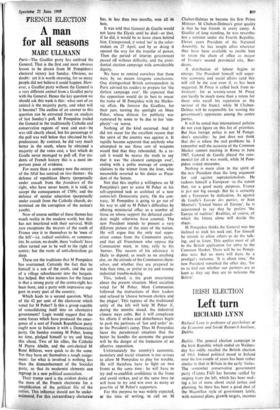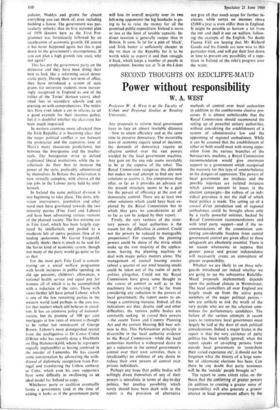Left turn
IRISH ELECTION RICHARD LYNN
Richard Lynn is professor of psychology at the Economic and Social Research Institute, Dublin.
Dublin—The general election campaign in the Irish Republic which ended on Wednes- day has oddly recalled the British election of 1964. Indeed political mood in Ireland over the last couple of years has been rather similar to that in Britain in the early 'sixties. The somewhat conservative government party (Fianna Fail) has become rattled by sniping from the left, which has been mak- ing a lot of noise about social justice and planning. So there has been a good deal of the Macmillan style of government lately, with national plans, growth targets, incomes
policies, Neddys and grants for almost everything you can think of, even including building a house. The government was par- ticularly unlucky that its first national plan of 1959 (known here as the First Pro- gramme) was fortuitously followed by an acceleration of economic growth. Of course it has never happened again, but this is put down to the government's incompetence. If you can plan a high growth rate once, why not again?
This has put the government party on the defensive and they have been doing their best to look like a reforming social demo- cratic party. During their last term of office, they have introduced a system of state grants for university students (now increas- ingly recognised in England as one of the follies of the Tories' thirteen years), abol- ished fees in secondary schools and are pressing on with comprehensives. The minis- ters have even taken a cut in salaries to set a good example for their incomes policy, but it is doubtful whether the electorate has been much impressed.
In western countries more advanced than the Irish Republic it is becoming clear that the major political conflict is not between the proletariat and the capitalists (one of Marx's many inaccurate predictions), but between the bourgeoisie and the intellec- tuals. The bourgeoisie strive to defend traditional liberal institutions, while the in- tellectuals do their best to increase the power of the state, preferably administered by themselves. In Britain this polarisation is now virtually complete, with almost all the top jobs in the Labour party held by intel- lectuals.
In Ireland the same political division is just beginning to take place. The dons, tele- vision interviewers, journalists and other word men have gravitated towards the two minority parties (Fine Gael and Labour) and have been advocating various versions of the planned society. The less extreme are in Fine Gael, which has been largely cap- tured by intellectuals and pushed to a moderate left of centre position. One of its leading spokesmen, Mr Garret Fitzgerald, actually thinks there is much to be said for the Soviet kind of economic system, though not many of the party would go quite so far as that.
For the most part, Fine Gad is concen- trating on a social welfare programme with lavish increases in public spending on old age pensions, children's allowances, a national health service and equal pay for women, all of which is to be accomplished with a reduction of the rates. Those with views further left have joined Labour, which is one of the few remaining parties in the western world (and perhaps in the east too, for that matter) which still believes in social- ism. It has an extensive policy of national- isation, but its promise of 100 per cent mortgages at low rates of interest is thought to be rather too reminiscent of George Brown. Labour's most distinguished recruit from the intelligentsia is Dr Conor Cruise O'Brien who has recently done a Hochhuth on Dag Hammarskjerld, whom he represents (equally implausibly) as having connived in the murder of Lumumba. He has caused some consternation by advocating the with- drawal of diplomatic recognition from Por- tugal and transferring the Lisbon embassy to Cuba, which even his own supporters have some difficulty in swallowing as an ideal model for Ireland to copy.
Whichever party or coalition eventually forms a government (and at the time of writing it looks as if the government party
will lose .its overall majority over its two left-wing opponents) the big headache is go- ing to be to raise the money for all the promised public expenditure. Ireland is more or less at the limit of taxable capacity. In- direct taxation is generally steeper than in Britain. It costs 3s Id for a pint of 'black', and Irish butter is sufficiently cheaper in the UK than in the Republic for it to be worth while to export it and then smuggle it back, which keeps a number of people in employment. Income tax at 7s in the f does not give all that much scope for further in- creases, while surtax on incomes above £5,000 a year is even stiffer than in England. It might be possible to borrow a lot from the IMF and shell it out on welfare, follow- ing the example of the English. No doubt Fianna Fail are hoping that Mr Richard Goode and his friends are now wise to this particular trick, and will put their foot down in time to prevent any possibility of a repe- tition in Ireland of the rake's progress over the water.







































 Previous page
Previous page